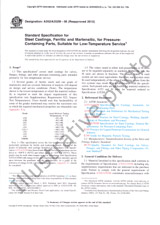We need your consent to use the individual data so that you can see information about your interests, among other things. Click "OK" to give your consent.
ASTM C1699-09(2023)
Standard Test Method for Moisture Retention Curves of Porous Building Materials Using Pressure Plates
Translate name
STANDARD published on 15.3.2023
The information about the standard:
Designation standards: ASTM C1699-09(2023)
Publication date standards: 15.3.2023
SKU: NS-1137924
The number of pages: 4
Approximate weight : 12 g (0.03 lbs)
Country: American technical standard
Category: Technical standards ASTM
The category - similar standards:
Annotation of standard text ASTM C1699-09(2023) :
Keywords:
moisture content, pressure plate apparatus, water vapor sorption,, ICS Number Code 91.100.10 (Cement. Gypsum. Lime. Mortar)
Additional information
| Significance and Use | ||||||||
|
4.1?The purpose of this test is to obtain, by means of a specified laboratory procedure, the values of the equilibrium moisture content at higher RH levels ((? 95 to 100%). These values are used either as means to characterize the material or as material characteristics needed as input to appropriate computer models that can simulate wetting or drying potential of individual building materials or material assemblies under specified environmental conditions. |
||||||||
| 1. Scope | ||||||||
|
1.1?This test method specifies a laboratory procedure for the determination of the water retention curve (or moisture storage capacity) of porous building materials at very high relative humidity (RH) levels (? 95 to 100% RH) corresponding to the capillary moisture region of the sorption isotherm. This is achieved by using the pressure plate test apparatus. This technique was originally developed to study soil moisture content and eventually had been adapted to building construction materials. 1.2?At higher RH levels (? 95 to 100% RH) of the sorption isotherm (see Test Method C1498), use of climatic chamber is not an option. This technique uses overpressure to extract water out of the pore structure of porous materials until equilibrium between the moisture content in the specimens and the corresponding overpressure is achieved. Using the pressure plate extractors, equilibrium can only be reached by desorption. 1.3?The values stated in SI units are to be regarded as standard. No other units of measurement are included in this standard. 1.4?This standard does not purport to address all of the safety concerns, if any, associated with its use. It is the responsibility of the user of this standard to establish appropriate safety, health, and environmental practices and determine the applicability of regulatory limitations prior to use. 1.5?This international standard was developed in accordance with internationally recognized principles on standardization established in the Decision on Principles for the Development of International Standards, Guides and Recommendations issued by the World Trade Organization Technical Barriers to Trade (TBT) Committee. |
||||||||
| 2. Referenced Documents | ||||||||
|
We recommend:
Technical standards updating
Do you want to make sure you use only the valid technical standards?
We can offer you a solution which will provide you a monthly overview concerning the updating of standards which you use.
Would you like to know more? Look at this page.




 Cookies
Cookies
